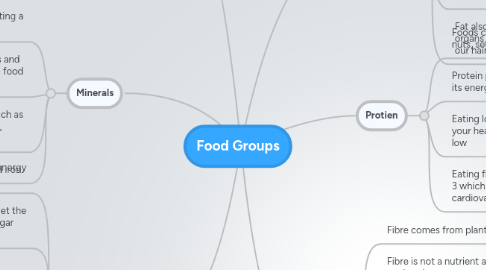Food Groups
создатель Harry Buxcey


1. Minerals
1.1. You get minerals by eating a balanced diet.
1.2. minerals help build stung bones bones and teeth, control body fluids and turn the food you eat into energy.
1.3. Minerals are found in different foods such as meat, cereals, fish, milk and dairy foods, vegetables, fruit and nuts
1.4. Essential minerals include calcium and iron.
2. Carbohydrates
2.1. Carbohydrates are an ideal source of energy for the body
2.2. A diet too high in carbohydrates can upset the delicate balance of your body's blood sugar level
2.3. It is better to balance your intake of carbohydrates with protein, a little fat and fibre.
2.4. There are two types of carbohydrate: complex and simple.
2.5. Complex Carbohydrates are things like bananas, nuts, sweet corn, wholemeal things, beans and so on.
2.6. Simple carbohydrates are things like honey, pizza, soft drinks, sweets, chocolate and so on.
2.7. Eating too many carbohydrates can lead you to a weight gain.
3. Vitamins
3.1. Vitamin A is good for eyesight, growth, appetite and taste. This vitamin is fat-soluble and so is stored in the body for a long time
3.2. Vitamin B is good for the nervous system, digestion, muscles, heart, alcohol-damaged nerve tissues.
3.3. Vitamin Cis good for immune defence system, protection from viruses and bacteria, healing wounds, reducing cholesterol and preventing scurvy. Large doses can cause diarrhoea and nausea
3.4. Vitamin D is good for Strong bones and teeth.The vitamin is fat-soluble so it is stored in the body.
3.5. Vitamin E is good for Fighting toxin.
4. Fats
4.1. If you have to much saturated fat it can higher your cholestral and could lead to heart disease.
4.2. By eating to much fat you can become over weight or create type 2 diabetes and high blood pressure
4.3. Fats are also high in energy (calories).
4.4. Not all fat is bad because our body needs fat for energy and fat contains fatty acids which we need and the body can't create.
4.4.1. New node
